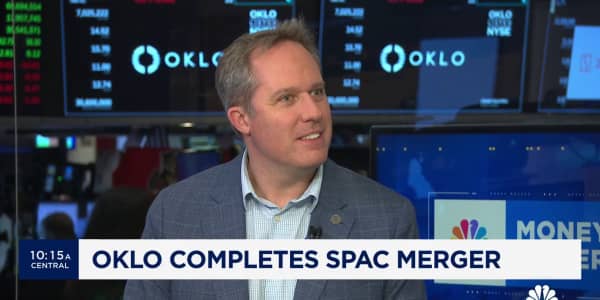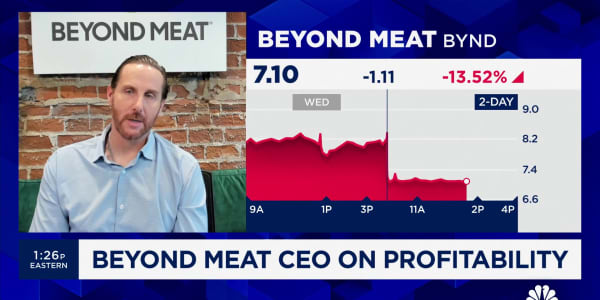
Investors looking to catch a ride with companies that have high-flying earnings projections should be wary before hopping aboard.
Historically speaking, companies that fall into what Goldman Sachs labels the "super-high growth" category underperform the market over a one-, three- and five-year basis.
While that's not particularly big news for anyone who follows the market closely—high profit expectations usually lead to high stock prices that generally overshoot real growth potential—the timing of a warning Goldman sent to clients this week suggests worries are building up that prices in some areas could be getting overheated.
"Companies that have very high expected growth tend to have very high multiples, and when you're trading at a high multiple and high expected growth, any shortcomings in that usually lead to a large downside in the stock if you fail to meet those high expectations," said Gary Flam, portfolio manager at Bel Air Investment Advisors, a Los Angeles-based firm that manages $7 billion for clients.
(Read more: US investors biggest scaredy-cats in the world)
Broadly speaking, the market's momentum since the financial crisis bottom—Wednesday is the fifth anniversary of the 's 666 cratering point—has come through investors following the "stocks-are-cheap" mantra.
Looking at historical values of the market index, that had been true. However, stocks are now closing in on their median price-to-earnings ratio, and it has some market watchers contemplating whether the market is still a bargain.
Flam harkened back not to the financial crisis but rather the dotcom bubble, citing the popularity then of stocks that had low or no earnings but supposedly teemed with potential. Flash-forward to the present day and investors are again fawning over names like electric luxury car manufacturer Tesla, social networking kingpin Facebook and online shopping giant Amazon, which has plenty of revenue for low or no profit, and there are some inescapable parallels.
(Read more: 'New Paranormal' and why black swans are circling)
"If you look back at the Internet bubble, Amazon is the exception and not the rule," Flam said. "By owning something like Tesla at a super-high multiple, you're making a bet if you will, or investing your dollar, in the exception, not the rule."
The Goldman note, authored by strategist David J. Kostin and others, points to several sexy high-growth stocks that look attractive, including Amazon, Netflix, Facebook, Rowan, Lennar and Loews, with median P/E ratios that might look attractive based on growth potential. There's a note of caution, though:
"Investors be warned: stocks with the highest long-term EPS growth expectations have historically underperformed the market. In the last 30 years, the median company with 30 percent consensus long-term growth has lagged the S&P 500 during the subsequent 1-, 3-, and 5-year periods. In fact, the only group of stocks that outperformed consisted of companies with negative expected long-term EPS growth."
Flam said there's something for investors to learn in a bull market that seems to have no end.
"This plays to behavioral psychology in that names like Tesla, Netflix—they have sex appeal, so people see the car, they read the articles, they see the stock's up," he said. "There's the excitement, but it's not really investing for most individuals, it's riding the momentum. It's a microcosm of what happened with the Internet craze, and so as we saw with the Internet craze at some point the music stops and there are a lot of losses to be had. Reading that (note from Goldman) tells me they're seeing that kind of thing starting in the marketplace."
If that's the case, though, the high-flier mania may only be in its infancy.
Jim Paulsen, chief market strategist at Wells Capital Management, sees a market that caught hold of itself a bit and even has tamped down some of the exuberance for the moment.
(Read more: Buyout barons ride market to $2.6 billion payday)
"At any point in time if you took a screen of the highest earnings growth expectations relative to norms, that probably will always be a fairly decent short, at least on a relative basis to the rest of the market," he said. "I think we've sort of done a process of correcting some of those valuations a little, or at least stopped the one-way train."
In the most recent earnings cycle, companies again easily beat expectations. But in the overall view, the earnings growth of 8 percent is closer to expectations of 9.6 percent, back in October 2013, than it was in January, when analysts had lowered their projection to 5.7 percent, according to S&P Capital IQ.
"Tesla, Facebook—those are all characteristic of things that ultimately end the cycle. I just don't think they're pronounced," Paulsen said. "It's more a stepping away from the 'the world's going to end,' to 'I guess it's not.' I don't think we're seeing yet where animal spirits are really out there."
—By CNBC's Jeff Cox. Follow him on Twitter @JeffCoxCNBCcom.






